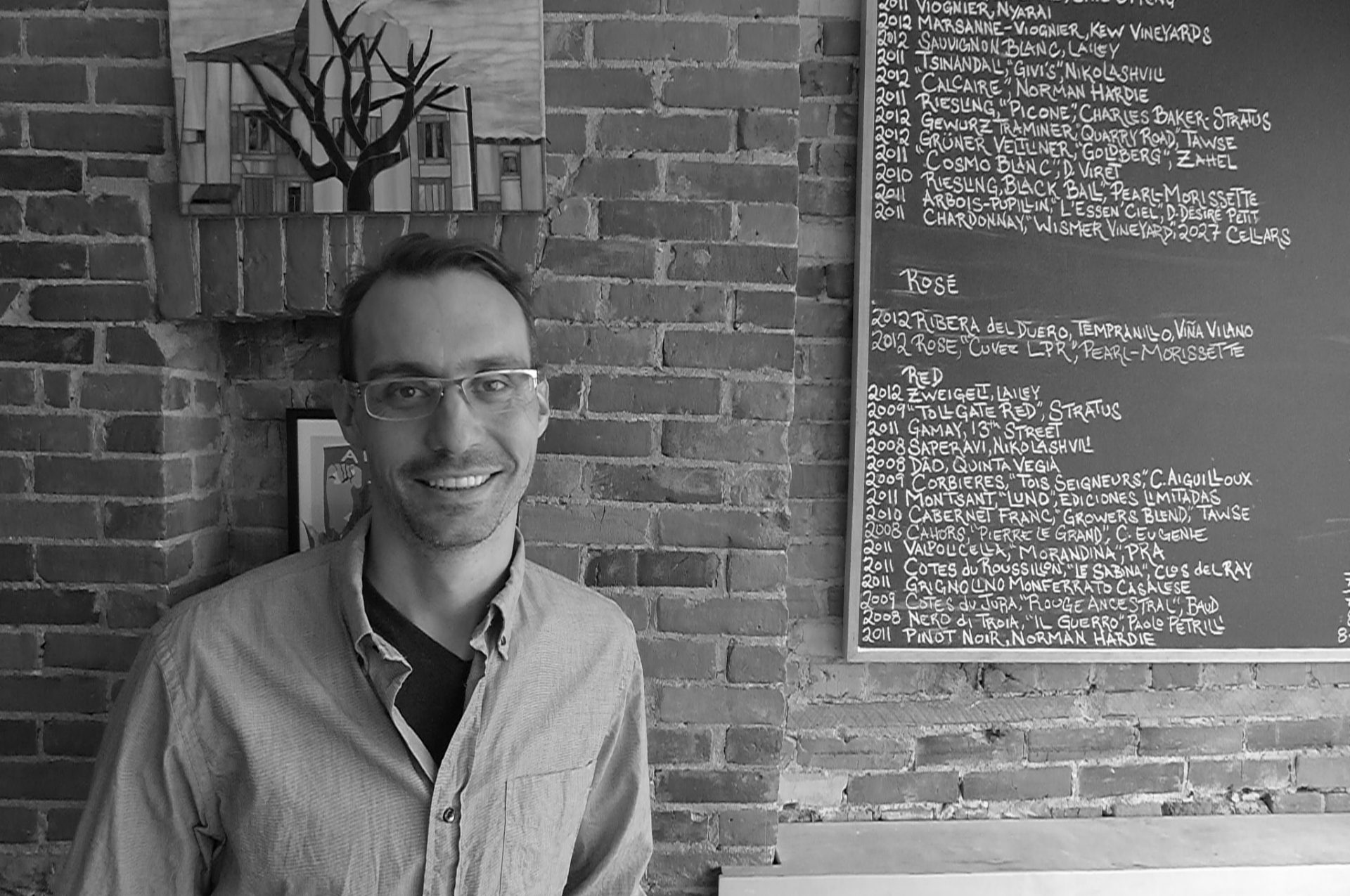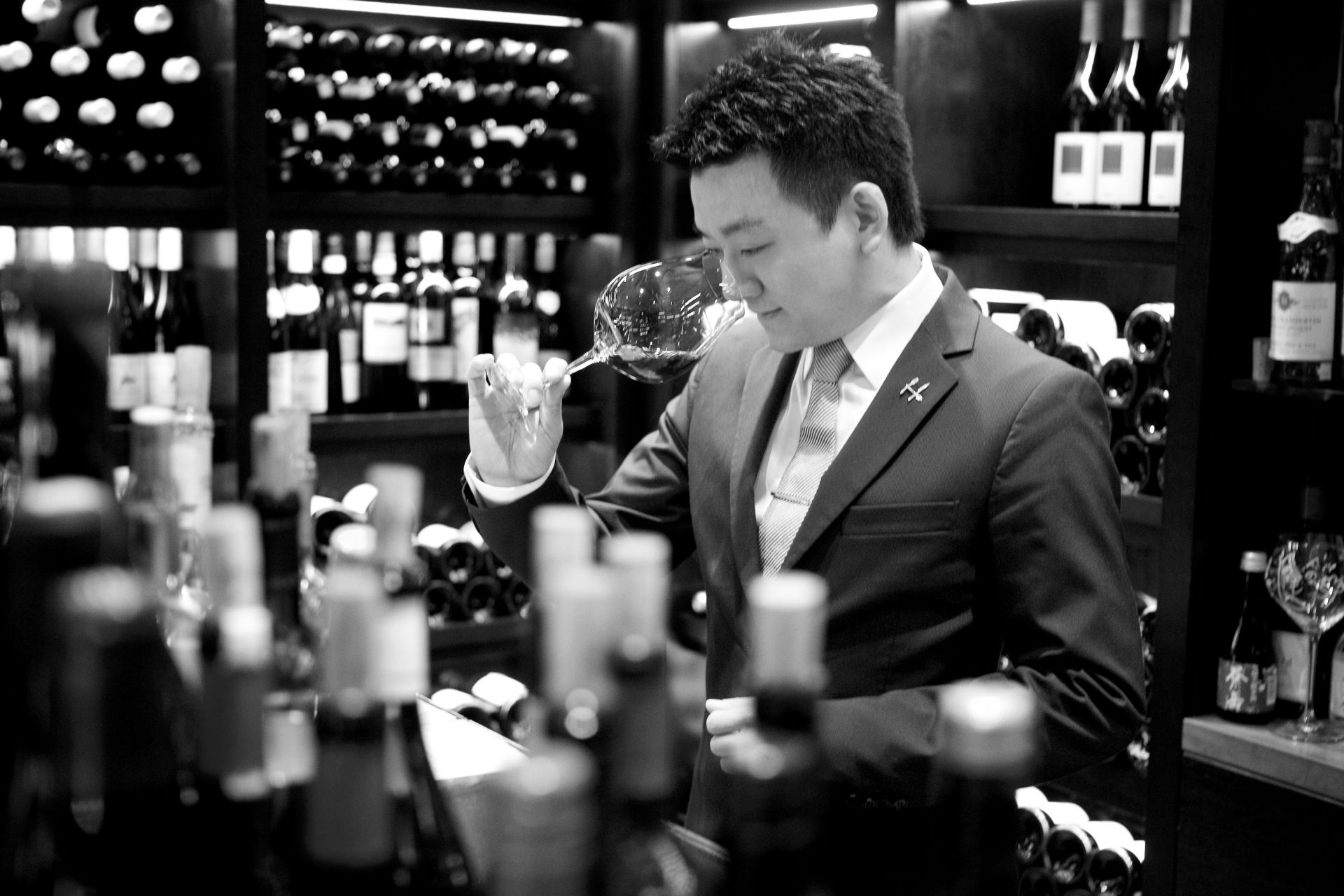
Sommelier Joshua Corea at his Dundas Street West Wine Bar, Archive.
In the third of a third (and very popular) series, we interview some of the most talented up-and-coming Sommeliers in Ontario. A few years back I was flicking through the pages of a locally published periodical and noticed that when it came to Sommeliers it was the same names that seemed to pop up over and over again. I was also becoming gradually cognisant of the fact that we more established wine folks were well and truly “losing our edge” to these young blood Sommeliers.
Being well aware of the depth of new talent that was out there I finally decided to get together with a couple of fellow Toronto Sommelier “Old Guard” (Anton Potvin and Peter Boyd) to assemble a line of questioning that would give us an entertaining insight into the minds of these rising stars.
Last year we put Pizza Libretto/Enoteca Sociale Sommelier Lesa LaPointe through the wringer in one of our most popular articles thus far. We followed this with an interview with the Owner/Wine Geek of Parkdale’s Café Taste, Mr. Jeremy Day, then with Zinta Steprans, who at that point was Sommelier at Toronto restaurants L’Unita and Malena but is now at Soho House, Carolyn Balogh of Abcon International Wines, Christopher Sealy of Midfield fame, then a debacle of an interview (my fault) with the mercurial Ms. Sheila Flaherty, ex of Mercatto and Pearl-Morisette, Café Boulud‘s Jordan Alessi, Lawrence‘s Sommelier Etheliya Hananova, Momofuku‘s Service Director Steve Sousa, and then the lovely, warm, generous, knowledgable lady that is Svetlana Atcheva, Mistress of Wines at Toronto’s Enoteca Ascari.
This week it’s the turn of Josh Corea, from Dundas West’s splendid Archive Wine Bar.
Good Food Revolution: So Joshua, what are you up to?
Joshua Corea: Drinking wine and answering questions?
GFR: Describe what you do at your wine bar Archive?
JC: I am one of the owners, wine selector, book keeper, waiter, bus boy, dishwasher and sometimes cook.
We have 40ish wines by the glass with a collection of obscurish bottles building up in the basement. We serve small pan Mediterranean tapas style plates and cicchetti (different toppings on tasted baguette) as well as a selection of meats and cheeses. Basically we do wine and snack food to go with wine. We also have beer, booze and cocktails. But really, wine’s the thing.
GFR: And how would you explain the wine program there?
JC: About 40-ish bottles by the glass (the number varies sometimes it’s more some times it’s less) about half of them from Ontario with the other half from other parts of the world (mostly old world)
GFR: And the food program?
JC: We do cicchetti, basically different toppings on toasted baguettes, an idea I stole during a trip to Venice. We have a selection of local cured meats and cheeses from Quebec and Europe and we do pan-Mediterranean tapas style small plates that go with wine. The various dishes were come up with by our two very talented cooks/chefs Ian Leipurts and Wendy Mah or stolen by me from friends or along my travels/travails.
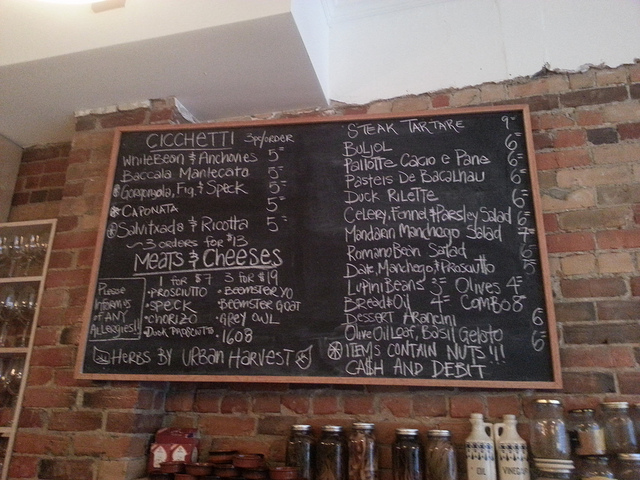
Archive Wine Bar’s Menu.
GFR: And how many agents do you deal with?
JC: 10ish but I’ve never really counted
GFR: What makes a good agent in your mind?
JC: They have good wine and the sense to not bring me wine not to my taste or try to hard sell me. Also they deliver quickly, and let me know when wines are running out.
GFR: How aware of wine were you whilst growing up? Were you around wine from an early age?
JC: I was fairly aware of wine growing up. There was often a bottle of wine on the dinner table, especially on “special” occasions.
Every fall on the street I grew up on there would be head high stacks of wooden boxes filled with pressed skins and seeds as aromas of fermentation wafted from garages on the lane and a stream of purple-red water ran down the curb side.
Wine was just there and as I got older I was allowed to try some with dinner.
GFR: When do you feel children should be introduced to the wonderful world of wine?
JC: When they show an interest in it. Obviously when they are younger you probably want to limit them to smelling it or a little sip, but as they get older I think wine and drinking should be introduced to them slowly and in context. Like now you’re 10 you get a small glass of watered down wine with dinner on special occasions.
Ok now you’re 13 now we’re going to start watering down your wine a little less. Oh you’ve turned 16 you get a full glass of wine with dinner. At 18 you get a couple glasses if you want. That way when they turn 19 the don’t go all ape shit doing beer bongs, gloryholes, boat races, keg stands and funnels while chugging mickeys the first time they get away from home.
I think the North American puritan mentality in regards to alcohol in general and to the idea of no drinking until you 19 specifically is based in a repressive denialist ideology. Telling teenagers that they can’t do something is just a guaranteed way of making sure that some (if not most or all) of them are going to do it so that they can rebel against their parents and “the man”. And in this rebellion they are more likely to consume alcohol in an irresponsible way and hurt, injure or kill themselves or others in the process or as a result.
Or we can take a reasoned approach and teach them to drink responsibly from a young age, ensure that drinking isn’t seen as something rebellious that sticks it to their parents, the man or society and all of a sudden it’s not so cool to talk about how you puked your guts out and had to get your stomach pumped on Monday morning.
Like you can teach them to swim or you can just chuck ‘em in the water and hope they figure it out, which way would you like your child to be taught? But hey we’ve got most of our alcohol regulation policy from the same stupid ideological play-book. If the aim is to stop kids from abusing alcohol than why not get rid of all the sugary pop like drinks and coolers, and generic high alcohol beers?
GFR: When did you first decide that you would like a career in wine?
JC: When I decided that since the TDSB was shrinking my career in teaching high school wasn’t going to go very far unless I wanted to commute or move out of Toronto.
GFR: So who or what gave you your first insight into the world of wine?
JC: My parents with wine at dinner. My friend Daniel Usher with a bottle of Chateauneuf de Pape he brought back for me when he was working in England that we drank a couple years later and was mind-blowing-ly good and provided me with one of my first euphoric wine experiences.
GFR: Describe your average clientele?
I’m not sure we’ve been open long enough to have and average clientele but some identifiable groups we see a lot of; Women between the ages of 25 and 60, service industry people late night when they get off work, “professionals” and creative types earlier in the evening. But all and all it’s a pretty mixed bag.
GFR: Which wine regions have you had the opportunity to visit?
JC: Niagara, PEC, Valpolicella, Piemonte (Asti, Alba and points between), and Liguria are all places where I’ve gone to look at vineyards and try wines specifically. I’ve been to some other regions where they produce wine but not for the purpose of going to vineyards or tasting wine.
GFR: Have you ever thought about making your own wine?
JC: I have made my own wine, as a science project in grade eight. It was horrible with more akin to vinegar than fine wine, we didn’t even want to drink it (not that our parents would have let us). I would love to try again sometime, I doubt I could do much worse.
GFR: And where would you like to make wine (in a pipe dream)?
JC: In my vineyard and winery, where ever that happens to exist in this particular pipe dream, because if you’re gonna pipe-dream, pipe-dream big.
GFR: Are Winemaker’s dinners more trouble than they are worth?
JC: I’ve never done a winemakers dinner, I’ll let you know what I think when I do. But I’m guessing it depends a lot on the winemaker. Note to any wine makers reading this, if you’re interested in being my first get in touch.
GFR: Seeing as you are an owner at Archive you have to work as a Manager as well as a Sommelier?
JC: And cleaner and busboy and dishwasher
GFR: Do you prefer managing bottles or people?
JC: Bottles don’t talk back but they also don’t clean up after me.
GFR: What have been your career highs and lows?
JC: Opening Archive has definitely been the high so far. As for the lows I try not to dwell down there.
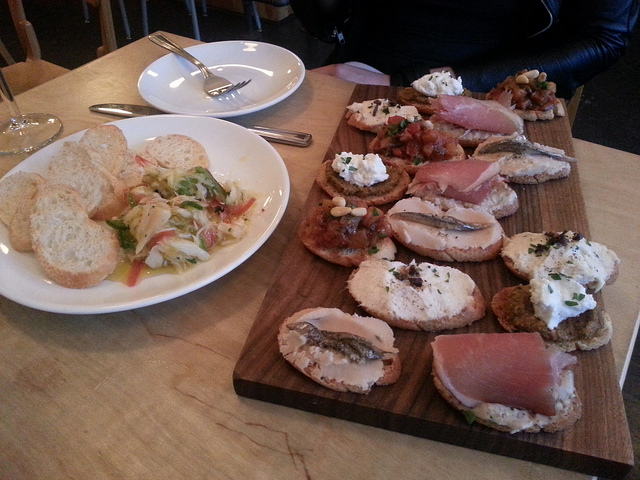
A splendid selection of Ciccheti at Archive Wine Bar
GFR: Who is, in your mind, a role model for Sommeliers??
JC: In terms of a world wide figure Jancis Robinson. In terms of Toronto; Svetlana Acheva for her hunger, passion, and taste & Peter Boyd for his taste, longevity and sense of humour. Also every sommelier who has become a wine maker e.g. Norman Hardie and François Morissette.
GFR: Tell us about your WORST customer ever?
JC: I try not to remember specifics of the worst but I’ve been yelled at, told off and verbally abused by hungry people whose grasp of rationality has slipped. Also the pompous, snobby wine “know it all” who’s unhappy I don’t have an over extracted and oaked Parker style California Cab from some industrial scaled producer doesn’t do a lot for me. But hey in the end that’s the business and if it’s not falling like water off the ducks back than maybe it’s time to move on and do something else or at least take a break
GFR: Sommeliers famously have Sundays off… What’s your idea of a perfect Sunday?
JC: Sleep in. Wake up to coffee and pastries in bed (I’m looking at you Pan Perdue) while watching one of cycling’s grand tours (Le Tour de France, Il Giro d’Italia or La Vuelta a Espana) and reading the paper. Make sweet sweet love. Go for a longish bike ride. Make sweet sweet love. Shower, eat breakfast, nap. Get up and go shopping for ingredients for dinner and grab lunch. Come home, make dinner and then spend four or five hours eating and drinking with family and friends in a wine and food induced gastronomic euphoria. Finish it off with some fine spirits, more wine or beer staying up to the wee hours talking then off to bed for making sweet sweet love and sleep.
GFR: Where are your favourite places to dine in Toronto… perhaps tell us a hidden treasure of your lovely city?
JC: I’m a big fan of Ortolan and The Emerson but I’m biased as the owners of these two establishments are friends of mine. I often have cravings for the Artic Char ceviche at Foxley and the tacos at Latin World next to the sally anne in Bloordale. But there are lots of great restaurants in T.O. I just don’t get out as much as I should (see perfect Sunday)
GFR: Do you cook yourself? What’s your favourite dish to cook these days?
JC: I do cook, but lately it’s mostly been for the wine bar. I’m looking forward to the fall season to making some lightly grilled steak, rested and sliced then covered in an anchovy, garlic, parsley and olive oil dressing/salad served with grilled radicchio veronese, as well as some venison or chestnut ravioli and the wild mushrooms sautéed in butter with white wine.
GFR: And have you had any cooking disasters?
JC: Yes but we don’t talk about those they just go in the bin and I keep the learnin’ for next time.
GFR: How do you feel about Canadian wines?
JC: I think there are a lot of good Canadian wines. Most of my experience is with wine from Ontario due to the inter-provincial trade restrictions but I have tasted some good wine from BC as well. I think that overall the quality has improved and is continuing to improve as new wineries open and older wineries strive to keep up. That being said there is still room for a lot of improvement and quite a few wineries producing wine that is not to my taste.
I think Ontario does whites and light to medium bodies best, due to the cool climate and that these are the wines that winemakers should focus on rather than making dried grape wines or doing other interventions in an effort to make full bodied reds. Now that I’ve said that though someone is going to show up with a really good full bodied red from Ontario and I’ll have to eat my words and list it.
I notice that while the public is starting to come around there are still a lot of people whose preconceptions of Canadian wine are unfavourable, one of the fun parts of the wine bar is shattering those preconceptions by getting people to taste a wine, having them like it and then revealing to them that it is Canadian. I think that the international press/recognition that Canadian wines are starting to garner is great, as there is a classic Canadian cultural problem that we will never believe that something from Canada is good unless we are told so by someone from the US, Britain or some other country.
I think that it is a travesty that our state owned liquor monopoly does not carry more Canadian wine. The LCBO should have a store in downtown Toronto that carries every wine from every winery in Ontario, no matter how small or how limited the production instead of only carrying the bigger producers across the whole province.
GFR: How do you feel about the possibility of LCBO privatisation and how would that affect Archive?
JC: I have some questions first;
I have some questions first;
How would it be privatized?
Would it turn into a private monopoly owned by large corporations like The Beer Store?
Because if so better to leave it the way it is.
Would the distribution of alcohol also be privatized or just the retail side?
I would prefer that the LCBO remain public and in operation but that the government open up the market to private competition (something like what goes on in BC). And before some well intentioned fool says something about the LCBO paying for health care and roads, the government would still collect its share of taxes and bring in the same amount of money (if not more) and the government should be raising that money up front through income and corporate taxes instead of sneakily snatching money from our pockets through “sin” taxes which as all flat taxes are felt disproportionately by the less well off members of society. I also don’t believe that opening up the market to private wine stores is going to increase the amount of alcohol abuse in the province as most of the people with serious alcohol issues are not drinking fine wine, they are drinking budget extra strong beers and cheap hard liquor.
If I was allowed I would happily not only sell you a glass of wine to drink in the wine bar but a bottle of wine to take home and enjoy with your dinner. I would also look at importing wine directly, something that as a liquor license holder I am currently barred from doing. I think it could be great for Archive as we would be able to operate like wine bars in civilized European countries. Basically most of the laws regarding liquor distribution, sale and consumption should be rewritten, the sky is not going to fall if you can grab a beer at the corner store, enjoy a glass of wine in the park or get a drink after 2am. Restrictions and repression are not going to reduce substance/alcohol abuse, but education funded by the taxes already put on alcohol will.
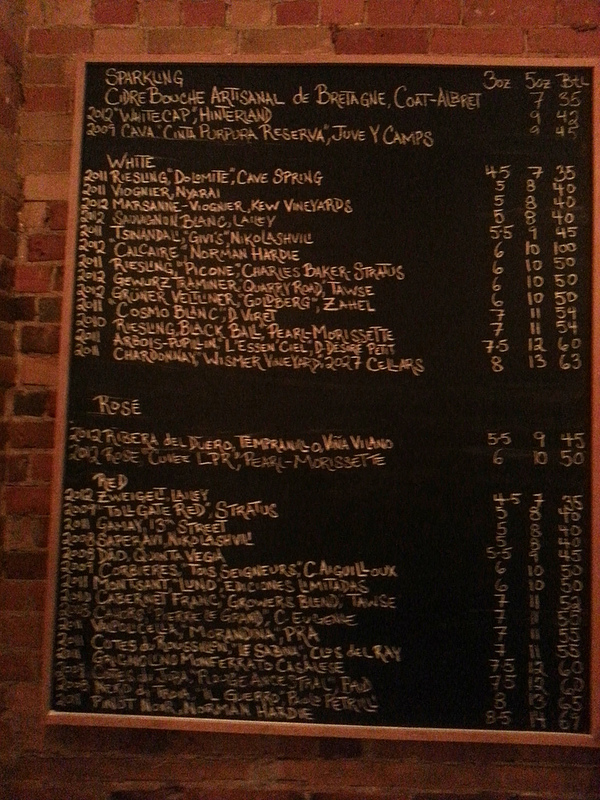
The rather good wine list at Archive.
GFR: What are the biggest challenges running a wine bar in Toronto?
JC: Dealing with the Byzantine city and provincial licensing requirements
Being unable to operate like Wine Bars in other parts of the world where you can get a glass for here or a bottle to go
Convincing people that wine doesn’t have to be intimidating and the most important thing is to drink what you like, rather than drinking what you think you are expected to like
Educating the “American palate” which tends to like boldly flavoured sickly sweet pop and cocktails over the nuanced and restrained flavours found in many wines.
GFR: How do you feel about Toronto as a wine city?
JC: I think that the interest in wine is growing in Toronto, although I don’t know that I’d call it a wine city yet. In addition to self confessed wine nerds we get a lot of people who may not know a lot about wine, but are interested in learning more. Part of our job as purveyors is to make wine accessible to those who want to learn more about what kind of styles they like.
GFR: What would you be doing if you were not a Sommelier?
JC: I’m not a Sommelier, I have no accreditation from any of the various bodies that give out such things. I run a restaurant and select wines, if I wasn’t doing this I dunno I guess I’d have to find a “real” job, get up early in the morning and drink less.
GFR: What does your Mother wish you were doing?… I know that mine probably wishes I was a Doctor…
JC: Mom is pretty cool, she’s happy if I’m happy. She says she is glad that I am living out her fantasy of having a restaurant/bar.
GFR: I know that you have many non-industry friends… how do they feel about what you do for a living?
JC: I’ve never really thought about it. I guess some get it and some don’t, but we’re friends because hanging out together is fun not because of what we do (many of my friends I’ve know from high school daze or earlier so what I do came after we were friends).
GFR: What are your thoughts on blind tasting?
JC: As a technique for evaluating wine without preconceptions or bias I think it’s a great idea and probably one I and others don’t do enough. As the Sommelier parlour trick of being able to identify a wine’s origin or vintage I think it can be a bit of a useless side show (which may be great for TV but is essentially useless in real life). For one it relies on “typicity”, something I don’t really care about. I don’t care if a wine tastes “typical” I care if it tastes good.
I like wine because of the variety of flavours/styles not because it all tastes the same (that would be boring) and if a certain variety tastes different then it “should” it doesn’t necessarily mean the wine tastes bad (in fact it often makes it more interesting for me). I also find that this sort of tasting can devolve into a stupid penis game where everyone (women too) whip out their metaphorical members to measure whose is “biggest” in a vain competition to show they are the most learn-ed of all which is used as a pompous pump for already over inflated egos.
GFR: What’s your current favourite wine region?
JC: I love all the wine regions, “variety is the spice of life” and what draws me to wine is that spice. That being said I generally prefer aristocratic old world style wines over brash nouveau rich new world wine styles. But there is great wine being grown/made in every region, if you haven’t seen it that doesn’t mean it isn’t out there.
GFR: Where else can one get decent wine out in the West end?
JC: As far as west end wine bars go there is also Midfield and Mavrick, Enoteca Sociale is a wine focused restaurant with a biggish list (I haven’t been in a while so I’m not sure what their list is looking like these days). Ortolan and Foxley are two restaurants with good wine lists that I can always find something I’m interested in drinking.
GFR: When it comes to wine is there anything that you feel is overrated?
JC: Snobbery. People should drink what they like, not what the “experts” have told them they should like. There are a lot of wines that are not to my taste but that doesn’t necessarily make them “bad”, it just means I don’t like them and it’s totally ok if other people do.
As far as wine styles or regions wine buyers should understand that if you are buying wine from a big name region or producer you are going to pay more for the same quality than if you buy from a less well known producer or region. Try something new.
GFR: What is your favourite wine pairing right now? A dish on your current menu?
JC: Steak Tartare and the Baud Pere et Fils Cuvee Tradition Rouge ( a field blend of 70% Trousseau and 30% Pinot Noir). I know that some say you should pair Tartare with white wine but I prefer a savoury light bodied red that has some earthy funk.
GFR: Okay… three pairings with me on the spot?… but with… airplane food
1: Chicken (À la plane)
JC: Something white big round and juicy, maybe a southern Rhone Viognier, Grenache blanc, Marsanne or Rousanne based wine. Something to bring some life to that nasty dry overcooked boneless skinless chicken breast that should have been dog food and that can overpower what ever insipid “sauce” they have put it in.
2. Beef (À la plane)
JC: Something big and red, what ever is your favorite in this category, as it doesn’t really matter what it is just as long as it can overpower the flovourlessness of the overcooked grey meat like hunk of fiberous protein. It should have enough tannin and acid to cut through the corn starch thickened “Jus”. If you must go lighter don’t bother with subtlety as it will be lost, go Beaujolais Village or some kind of “lighter” Grenache based Cote du Rhone so you can at least rinse the nasty flavour from your mouth with something juicy.
3. Pretzels (À la plane)
JC: Beer, a nice Heineken or some other pilsner that’s clean and crisp with a touch of hops.
GFR: Now… which wines would you pair with these pieces of music?
JC: Something funky and weird, probably lighter bodied. I’m thinking of of a Fixin I tried at Enoteca Ascari a couple of weeks ago. It was all smokey and flinty and earthy and savoury. You need something with layers you can meditate on while zoning out to the ambient beats and watching the monkey children get smoked by cars. I’m just wondering if they would have gotten into less accidents if they didn’t have the monkey masks covering their eyes and limiting their field of vision. Jus’ sayin.
JC: Wow. I think some kind of very high alcohol Rose (the Pearl-Morissette LPR comes to mind) and while I do not condone, wish to popularize or promote the use of illegal drugs if you combined that with some GHB or poppers you might be right on the money for this video. The “music” kind of reminds me of the sound made by a wood router so something with a lot of alcohol would help you pass out faster so you didn’t have to hear it any more.
GFR: I don’t know… I quite like it myself… sounds like early Cabaret Voltaire or something… I’m not sure about the wine match though.
Something bubbly and off dry, not too complicated and very crushable. I’m thinking sparkling Gamay like a Bugey-Cerdon or the Ancestral from Hinterland. It would go with the bubbly upbeat music and since you’re busy at the club giving and receiving massages in a cuddle puddle and/or talking about how great you are while chewing on your face, something more complex would just get lost. Also someone should tell this guy not to dance unless he likes being ridiculed.
GFR: Do you often drink beers or spirits?
JC: Beer more than spirits. I generally favour pilsners or other clean crisp and slightly hoppy beers over the burning mouth sensation one gets from the current trend in over hopped high alcohol craft brewed IPA’s (they kind of remind me of over extracted “Parker” wines). As for spirits I’ll drink them all as long as they are good. Grappa, Eau de Vie, Scotch, Rum (specifically Mount Gay or Cockspur), Anise flavoured guys, and more can all be good in moderation in the right time and place. I’m not big on sugary cocktails or anything with pop in it unless it’s a Mount Gay and Ginger ale in memory of my grandfather.
GFR: What is your least favourite part of your job as Sommelier? For me it was doing inventory…
JC: Inventory isn’t the funnest thing, but neither are pushy agents who use hard sell tactics or obnoxious customers. If you dwell on how much you don’t like something you have to do is it going to make the doing of it any easier/better?
GFR: What is your weapon of choice when it comes to a corkscrew?
JC: A black Pull-Taps hinged “waiter’s friend” type corkscrew or the simple T-shaped un-hinged straight pull type (it gets the cork to make a gratifying pop sound as it comes out but can be a little much for at a table)
GFR: What are your thoughts on natural wines?… I feel that there is more shit out there in that segment of the market than anywhere else.
JC: Really? You think there’s more shit in this category than in the over extracted, chaptalized, acidified/deacidified, oak chipped, reverse osmosis-ed, micro-oxidized, bulk industrially produced, softened to the point of being a generic tasting soda-pop wine like beverage set?
Not that there is anything wrong if you enjoy such wine like beverages, just that they are not to my taste and I would probably prefer to drink a “natural” wine that is approaching vinegar to one of poorer examples of them, simply because it would be a new interesting flavour set to ponder and savour rather than the same old same old.
I agree that there are wines out there with the “natural” label that in the end, no matter what the marketing value of the label, are not good and don’t taste good. I have also tasted quite a number of “natural” wines that I find unique, complex, invigorating and interesting. In the end I think it depends on your attitude/taste towards/for wine faults. To me there are many so called faults that in small quantities add complexity to a wine while in large quantities make it undrinkable or bad.
A little bit of volatility or bretty funk or oxidation or reduction can make a wine more interesting to me. Completely clean textbook “typicity” examples that have had their soul scrubbed away by 2µm filters and cold stabilization are usually less interesting to me. But this is a matter of personal taste (which can and does change with time/mood/season etc.), and everyone is free to like what they want and hopefully everyone drinking what they like allows for a wide diversity of wine styles so that we can all keep discovering new things in wine.
I don’t necessarily “believe” in bio-dynamics or some of the other philosophies/practices of some of those claiming to make “natural wine” (has anyone come up with a coherent definition yet?), I do think that when I look at the wines I’ve drank over the last few years that really blew me away with how good they were, many of those would have been produced using these practices/philosophies. There have also been wines made in a more interventionist style that have blown me away.
To me every wine category has good and bad in it, part of the fun is discovering the stuff that you really like. Blanket statements or prejudice don’t help us to honestly evaluate a specific wine in an unbiased fashion.
GFR: Sommeliers often have quite the increased tolerance for wine/booze. What is your limit?
JC: A lot. (I usually try to stop before I get there.)
GFR: Have you ever been “cut off”?
JC: Yes, I was kicked out of the Drake and I deserved it and didn’t cause a scene or get pissy with the bartender (although that may have had something to do with the rather large bouncer holding me by the scruff of my jacket collar).
GFR: How many wines do you taste in a week?
JC: (I am assuming you mean new wines) Sometimes only a couple, sometimes close to 100. It really depends on the time of year, how many trade shows are going on, which agents are knocking at my door etc.
GFR: Do you spit or swallow?
JC: I swallow the good stuff and spit the rest.
GFR: What’s your “house” wine at home?
JC: I don’t really have a house wine at home, if I’m buying wine it’s usually in an effort to taste new things (if not a new variety or producer than a new vintage) or I’m pulling something up from the basement to see how it’s evolved or because I know that it’s what I really feel like that night.
GFR: Do you keep a cellar at home?
JC: Yes, although opening a new business hasn’t been so kind to it, there is still some goodness down there (as well as a few bottles I’d rather forget).
GFR: Most remembered glass of wine ever?
JC: A glass of Pinot Noir from Prince Edward County (it was a limited run by some one doing the virtual thing out of the Grange, I forget the name though) that I had at Damon from Ortolan’s house that belonged to Svetlana (Ascari). It was one of those wine moments when the clouds parted and the beam of light shone through to illuminate me in the singing of angels as the wine filled my senses.
GFR: What is your perfect glass (or bottle) of wine at the end of a crazy night at the restaurant?
JC: Right now I’m really liking the Pearl Morissette LPR and if I was going to drink a glass at the end of the night it would probably be this, but really, at the end of a long hard night I want a clean cold refreshing Heineken or some other variety of pilsner.
GFR: Woah, you do love that Heineken, don’t you?
And now the cheesy question Josh… If you were a grape varietal what would you be?
JC: Wow, I dunno. Maybe a Malbec from Cahors cuz I’m tall dark and savory? Except that I’m not that tall. Maybe Touriga Nacional because our last name comes from Portugal? Or maybe Bastardo because…….. 😉
I think I’m going to have to give up on this one, maybe spirit grape totems should be like nick names and you have to let other people pick them for you?
GFR: Thanks for being such a great sport Josh!

Edinburgh-born/Toronto-based Sommelier, consultant, writer, judge and educator Jamie Drummond is the Director of Programs/Editor of Good Food Revolution.
Peter Boyd has been a part of Toronto’s wine scene for over two decades. He has taught the Diploma level for the International Sommeliers Guild, and has been the sommelier at Scaramouche Restaurant since 1993. He also writes about wine, food and pop culture and raises show molerats for fun and profit. He’s also one of the most solid guys in the business.Trust this man. Seriously… he knows his shit and it TAKING OVER THIS CITY!
A well-known and much respected figure on the Toronto food and wine scene for almost twenty years, Potvin has worked in many of the city’s very best establishments including Biffs, Canoe, and Eau. In 2004 Potvin opened his incarnation of the Niagara Street Café, a restaurant that has gone from strength to strength year after year, with universal critical acclaim. Anton spends much of his time traveling and tasting wine and has been ranked highly in consecutive years of the International Wine Challenge. Anton is currently the General Manager/Sommelier of the newly opened Chase restaurant.

